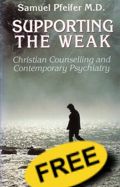|
|
|
|
|
 |
INTRODUCTION: Christian Counselling and Psychiatry (PDF) |
|
|
|
|
|
|
 |
CHAPTER 1 - Psychiatry under fire (PDF)
 |
|
|
|
Christians have problems, too - Illness or Problems? -Severe Psychiatric Disorders - Psycholoy and Psychotherapy - A substitute Religion? - Psychology, Psychotherapy or Psychiatry? - Criticism of psychiatry - Diagnosis: Merely Labelling? - Should psychiatric Hospitals be Closed? - Repression of Morals and Religion? - Psychiatry and Pastoral Care: conflicting or Complimentary?
 |
|
|
 |
CHAPTER 2 - The Image of Human Nature in Psychotherapy
 |
|
|
|
Models of the Psyche – The Analytic-Dynamic Model – Inner Healing – The Behavioural / Moralistic Model – The Humanistic Relationship Oriented Model – Self Actualisation: A Mirage – Challenge to Pastoral Care – Transpersonal Psychology – Mysticism and Magic as Therapy – Hold on to what is good.

|
|
|
 |
Chapter 3: The miracle of the human brain
 |
|
|
|
What do we know about the brain? – The Brain and Psychiatry – A map of the brain – The search for Personality – The world of Brain Cells – The Miracle of the Synapse – Valium, A synthetic Neurotransmitter – The Autonomic Nervous System – The Brain – A Computer? – Brain, Soul or Spirit?
 |
|
|
 |
Chapter 4: How mental illness develops
 |
|
|
|
Biblical Concepts and the Bio-Psycho-Social Model – Disposition: the Stuff We are made of – Temperament: Inherited or Acquired? – My Strength is made perfect in Weakness – Environment: Life’s Burden – Childhood Influences – Living with Stress – Stress and Vulnerability – Reaction: The Power of Thoughts – Our “Belief System” – A New Way of Thinking.
 |
|
|
 |
Chapter 5: Neurotic disorders an overview
 |
|
|
|
Are we all neurotic? – Psychological Reactions in a Crisis – Exactly, what is neurosis?- The causes of “neuroses” – Disposition, Environment, Reaction – Diagnostic Features of Neurosis.
 |
|
|
 |
Chapter 6: Anxiety, compulsions, and hysteria
 |
|
|
|
Anxiety as an Illness – Imprisoned by Fear – Help With Anxiety Syndromes – Obsessive Compulsive Disorder (OCD) – Therapy for OCD – The Histrionic Personality – Setting Boundaries – Does Faith Make You Neurotic? – Chances and Limitations of Pastoral Care – Empathic Compassion
  |
|
|
 |
Chapter 7: Depression – an Overview (PDF)
 |
|
|
|
A Desparate Search for Help – How to Recognise a Depression – The Forms of Depression – Diagnostic Criteria for Depression and for Mania – Physical Symptoms of Depression – The Beck Depression Inventory – How Does Depression Develop? – Mild and Moderate Depression – Severe Endogenous Depression – The Course of Severe Depression -Delusions of Guilt and Sinfulness – Mania: From joy to derailment.
  |
|
|
 |
Chapter 8: Therapy and pastoral care of severe depression
 |
|
|
|
Guidelines for Counselling the Depressed – Avoidable Mistakes – Practical help and encouragement – Pharmacotherapy: Help through medication – Personality Change through Antidepressants? – The problem of Suicide – Helping People at Risk from Suicidal Tendencies – Help for the Pastoral Counsellor.
 |
|
|
 |
Chapter 9: Schizophrenia: an Overview
 |
|
|
|
Definitions and Statistics – Diagnostic Criteria for Schizophrenia (DSM-IV) – Forms and Cause of Schizophrenia – Hebephrenia or disorganized type – Catatonic schizophrenia – Paranoid schizophrenia – The Course of Schizophrenia – The Psychosis as a »Jamming Station« – How Does Schizophrenia Develop? – Schizophrenic Phenomena and their Explanations.
 |
|
|
 |
Chapter 10: Schizophrenia and religious faith
 |
|
|
|
Explaining Religious Delusions – Religious images used to explain schizophrenic experience – Delusive distortions of genuine religious faith – Unusual expressions of faith – Does Christianity make you psychotic? – Schizophrenia in the Literature on Pastoral Care – Schizophrenia and Sin – Schizophrenia and the Occult.
 |
|
|
 |
Chapter 11: Schizophrenia: Therapy and Pastoral Care
 |
|
|
|
Three Pillars in the Treatment of Schizophrenia – Medication – Daily structure – Emotional climate – A Word about the Psychotherapy of Schizophrenia – Pastoral Care for the Schizophrenic Person – How to Respond to Acute Symptoms – Pastoral Care on the Return From Hospital – Questions of Meaning and Faith – Questions About The Illness – Compassion and Patience – Rehabilitation: Support or Burden?
 |
|
|
 |
Chapter 12: Integrated care for the mentally ill
 |
|
|
|
Multidimensional Perspective – The Goal of Pastoral Care – Biblical Pastoral Care is Practical – A comprehensive model of helping – Encouragement through helpful talk – Support, Activation, Rehabilitation – Don’t forget the family – Help from Medication – A Supplement to Pastoral Care – Preventive Care.
 |
|
|
 |
Chapter 13: Living with limitations.
 |
|
|
|
Five Stages of Grief – Can Faith Give Support? – Faith Healing – The Limitations of Manageability – Weakness: God’s power in earthen vessels – A fresh glimpse of hope – Supporting and being supported.
 |
|
|
|
|
|
|
|
 |
|
|
|
|
|
|
|
|
|
|
|
|
|
|
|
|
|
|
|
|
|
|
|
|
|
|
|
|
|
 ENGLISH
ENGLISH  FRANCAIS ¦
FRANCAIS ¦ 

